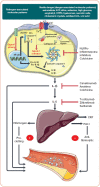Inflammation and Cardiovascular Disease: The Future
- PMID: 34093741
- PMCID: PMC8157394
- DOI: 10.15420/ecr.2020.50
Inflammation and Cardiovascular Disease: The Future
Abstract
Despite considerable advances in reducing the global burden of atherosclerotic cardiovascular disease by targeting conventional risk factors, significant residual risk remains, with low-grade inflammation being one of the strongest risk modifiers. Inflammatory processes within the arterial wall or systemic circulation, which are driven in a large part by modified lipoproteins but subsequently trigger a hypercoagulable state, are a hallmark of atherosclerotic cardiovascular disease and, in particular, its clinical complications. Extending conventional guideline-based clinical risk stratification algorithms by adding biomarkers of inflammation may refine phenotypic screening, improve risk stratification and guide treatment eligibility in cardiovascular disease prevention. The integration of interventions aimed at lowering the inflammatory burden, alone or in combination with aggressive lipid-modifying or even antithrombotic agents, for those at high cardiovascular risk may hold the potential to reduce the still substantial burden of cardiometabolic disease. This review provides perspectives on future clinical research in atherosclerosis addressing the tight interplay between inflammation, lipid metabolism and thrombosis, and its translation into clinical practice.
Keywords: Atherosclerosis; cardiovascular prevention; dyslipidaemia; inflammation; novel treatment strategies; residual risk.
Copyright © 2021, Radcliffe Cardiology.
Conflict of interest statement
Disclosure: KL has received speaker’s honoraria from Goerlich Pharma, Novo Nordisk, Sanofi and Amgen. CW has received lecture fees from Amgen, Daiichi Sankyo, Sanofi and Novartis. MDS reports scientific advisory activities with Alexion, Amgen, Esperion and Novartis. WK reports receiving consulting fees and lecture fees from AstraZeneca, Novartis and Amgen, consulting fees from Pfizer, the Medicines Company, DalCor Pharmaceuticals, Kowa, Corvidia Therapeutics, Genentech, Esperion, Novo Nordisk and Daiichi Sankyo, lecture fees from Berlin-Chemie, Bristol-Myers Squibb and Sanofi, and grant support and provision of reagents from Singulex, Abbott, Roche Diagnostics and Dr Beckmann Pharma; he has also been a member of the executive steering committees of JUPITER, CANTOS, SPIRE, GLAGOV and COLCOT. NA has no conflicts of interest to declare.
Figures
References
Publication types
LinkOut - more resources
Full Text Sources



